#Robert K. Massie
Text

Imagine being a clown doing clown business in 17th century Amsterdam when the largest man you will ever see in your life tries to persuade you in Dutch with a heavy Russian accent that not only is he the Tsar of Russia but that he wil give you a sizeable sum of rubles if you come with him to Moscow.
#Russian History#Peter the Great#Robert K. Massie#The Grand Embassy is my favourite part of the book#As for his height Peter was some 203 cm or 6 foot 8#Making him not only large for a Slavic person but also for his time#Ramblings
14 notes
·
View notes
Quote
For to tempt and to be tempted are things very nearly allied.
Robert K. Massie
4 notes
·
View notes
Photo

Infinitely more remarkable and more fatefully enigmatic than the riddle of Anastasia is the awesome, overwhelming drama of the Russian Revolution itself. The rise of Communism, brought by Lenin to Russia, its rooting there and the spreading of its doctrines and power around the globe are the pivotal historical events of our time. Ironically, the two great Communist nations, Russia and China, are the only world powers with which the United States has never warred. The current struggle dividing the world is not over trade or territory, but over ideology. This is the legacy of Lenin.
And also the legacy of Rasputin and hemophilia. Kerensky once said, “If there had been no Rasputin, there would have been no Lenin.” If this is true, it is also true that if there had been no hemophilia, there would have been no Rasputin. This is not to say that everything that happened in Russia and the world has stemmed entirely from the personal tragedy of a single boy. It is not to overlook the backwardness and restlessness of Russian society, the clamor for reform, the strain and battering of a world war, the gentle, retiring nature of the last Tsar. All of these had a powerful bruising impact on events. Even before the birth of the Tsarevich, autocracy was in retreat.
Here, precisely, is the point. Had it not been for the agony of Alexis’s hemophilia, had it not been for the desperation which made his mother turn to Rasputin, first to save her son, then to save the pure autocracy, might not Nicholas II have continued retreating into the role of constitutional monarch so happily filled by his cousin King George V? It might have happened, and, in fact, it was in this direction that Russian history was headed. In 1905, the Russian people had had a partial revolution. Absolute power was struck from the hands of the Tsar with the creation of the Duma. In the era of Stolypin and the Third Duma, cooperation between the throne and parliament reached a level of high promise for the future. During the war, the nation asked not for revolution but for reform—for a share of responsibility in fighting and winning the victory. But Alexandra, goaded by Rasputin, passionately objected to any sharing of the Imperial power. By giving way to his wife, by fighting to save the autocracy and denying every plea for responsible government, Nicholas made revolution and the eventual triumph of Lenin inevitable.
Why Lenin triumphed, why Nicholas failed, why Alexandra placed the fate of her son, her husband and his empire in the hands of a wandering holy man, why Alexis suffered from hemophilia—these are the true riddles of this historical tale. All of them have answers except, perhaps, the last.
- Nicholas and Alexandra, Robert K. Massie.
0 notes
Text
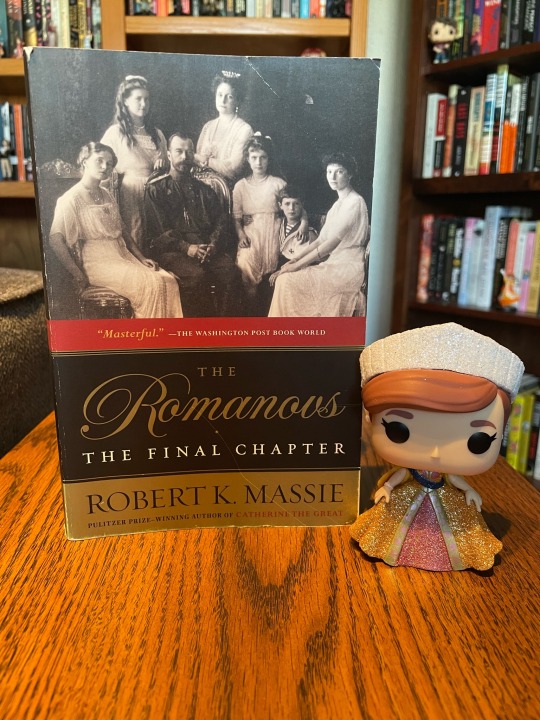
Read of The Romanovs the Final Chapter by Robert K. Massie (1995) (292pgs)
0 notes
Text
The Grand Duchesses and sweets
Scientists working with the dental remains of three of the Grand Duchesses concluded that their dental structure and fillings suggested they were “fond of sweets”.
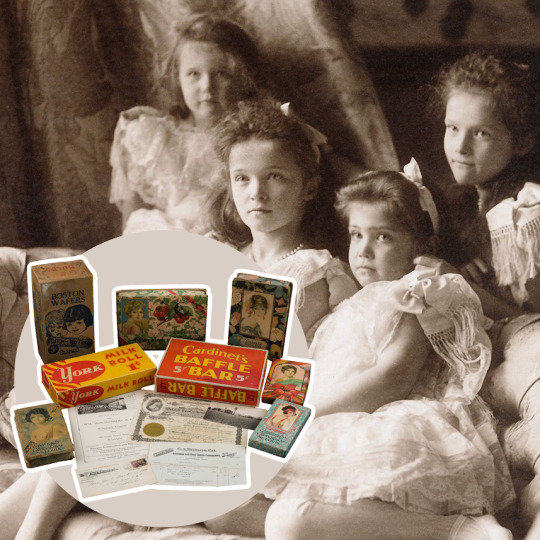
A favourite of the Grand Duchesses in the palace was Jim Hercules, an African American servant. The Grand Duchesses’ aunt, Olga Alexandrovna, recalls how Jim would spend his “annual holiday in the States and brought back jars of guava jelly as presents for the children.” Jim also brought them other American candy, and toys for their playroom.
The head baker at the palace, Ermolaev, specialised in making pastries and confectionery, and even the yacht Standart was equipped with a confectionery kitchen. However, the children still enjoyed the novelty of foreign imported sweets. In June 1912, it was reported that “when the Grand Duchess Anastasia, daughter of the Emperor Nicholas of Russia, celebrates the eleventh anniversary of her birth on June 18, she will have an abundant supply of American candy. Curtis Guild Jr, American Ambassador to Russia, left New York Tuesday on the Kaiser Wilhelm der Grosse with a trunkful of candy for her.”
In 1916, the Governor of Tver sent the Grand Duchesses pryaniki, a sweet gingerbread cookie biscuit that the region specialised in manufacturing. Sweets were also discussed by fans of the Grand Duchesses: Dolores Sybilla Adam, a teenager from California, once wrote a fan mail letter to Olga Nikolaevna, writing “I should dearly love to make you a great big box of candy and send it to you, from your friend, away in sunny California.”
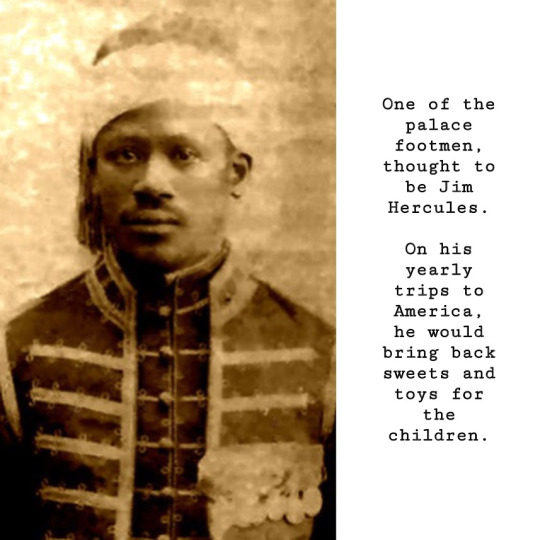
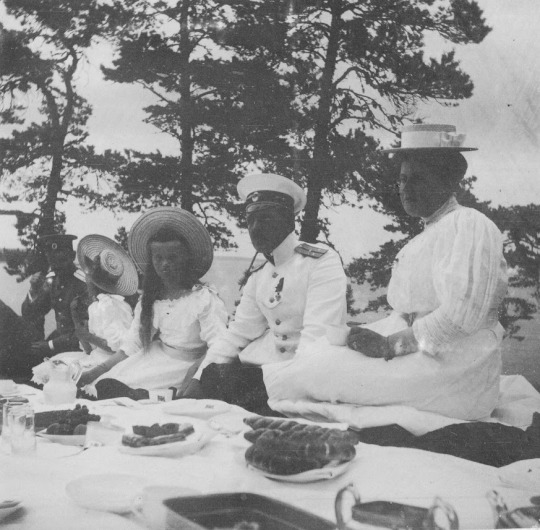

A love for sweets ran in the family. Conservators recently found a half-chewed piece of sugar paste candy hidden within the dress of the children’s aunt, Grand Duchess Xenia Alexandrovna!

Sources:
Correspondence of the Russian Grand Duchesses: Letters of the Daughters of the Last Tsar, George Hawkins, ([n.p], Independently Published, 2020) [no page numbers], letter beginning Dolores Sybilla Adam to Olga and Tatiana, Nov 25 1913, Amazon Kindle eBook
LUNCH ON THE BALCONY: Recipes from the table of Russia’s last imperial family, Helen Azar, ([n. p.], Independently Published, 2022), Ch. ‘The Confectionary’, [n. p. n] Amazon Kindle eBook
The Many Deaths of Tsar Nicholas II, Wendy Slater, (Oxfordshire: Routledge, 2007), Ch. ‘True Crime’, p. 40, Google Books eBook
Anon. ‘RomanovsOneLastDance’, ‘June 1912’, Tumblr, 25 March 2016
Nicholas and Alexandra, Robert K. Massie, (New York: Laurel, 1985), Ch. ‘The Tsar’s Village’, p. 123, archive.org eBook
Helen Azar, ‘LUNCH ON THE BALCONY: Recipes from the table of Russia’s last imperial family’,
(2022), Ch. ‘The Confectionary’
Photos:
Public domain, GARF, Heritage Auctions, HA.com, Russia Beyond
#olga nikolaevna#tatiana nikolaevna#maria nikolaevna#anastasia nikolaevna#otma#romanovs#sources#romanov#russian history#sweets#confectionary#cookies#my own
84 notes
·
View notes
Text

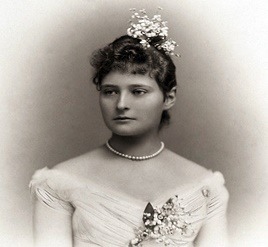
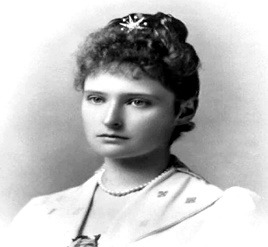

"The death of her mother at thirty-five, had a shattering effect on six-year-old Alix. She sat quiet and withdrawn in her playroom while her nurse stood in the corner, weeping. Even the toys she handled were new; the old, familiar toys had been burned as a precaution against the disease. Alix had been a merry, generous, warm little girl, obstinate but sensitive, with a hot temper. After this tragedy she began to seal herself off from other people. A hard shell of aloofness formed over her emotions, and her radiant smile appeared infrequently. Craving intimacy and affection, she held herself back. She grew to dislike unfamiliar places and to avoid unfamiliar people. Only in cozy family gatherings where she could count on warmth and understanding did Alix unwind. There, the shy, serious, cool Princess Alix became once again the merry, dimpled, loving "Sunny" of her early childhood. After her daughter's death, Queen Victoria treated Grand Duke Louis as her own son and invited him often to England with his motherless children. Alix, now the youngest, was the aging Queen's special favorite and Victoria kept a close watch on her little grand-child. Tutors and governesses in Darmstadt were required to send special reports to Windsor and receive, in return, a steady flow of advice and instruction from the Queen. Under this tutelage, Alix's standards of taste and morality became thoroughly English and thoroughly Victorian. The future Empress of Russia developed steadily into that most recognizable and respectable of creatures, a proper young English gentlewoman. Alix was an excellent student. By the time she was fifteen, she was thoroughly grounded in history, geography and English and German literature. She played the piano with a skill approaching brilliance, but she disliked playing in front of people. When Queen Victoria asked her to play for guests at Windsor, Alix obliged, but her reddened face betrayed her torment unlike Nicholas, who learned by rote, Alix loved to discuss abstract ideas. One of her tutors, an Englishwoman named Margaret Jackson — "Madgie" to Princess Alix — was interested in politics. Miss Jackson passed her fascination along to Alix, who grew up believing that politics was a subject not necessarily restricted to men. Alix's grandmother, after all, was a woman and still managed to be the dominant monarch in Europe."
Nicholas and Alexandra | Robert K. Massie
30 notes
·
View notes
Photo

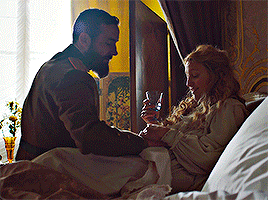

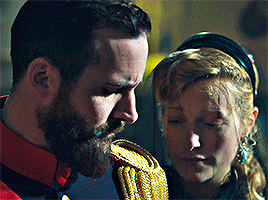

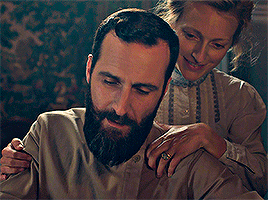
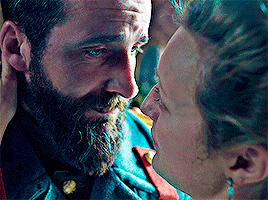

History meme
[5/7] Relationships: Nicholas II and Alexandra Feodorovna
On her wedding night, before going to bed, Alexandra wrote in her husband’s diary: “At last united, bound for life, and when this life is ended, we meet again in the other world and remain together for eternity. Yours, yours” (Nicholas and Alexandra by Robert K. Massie).
My dream is some day to marry Alix H. I have loved her a long while and still deeper and stronger since 1889 when she spent six weeks in St. Petersburg. For a long time, I resisted my feeling that my dearest dream will come true (Nicholas II’s 1892 diary entry).
The marriage that began that night remained unflawed for the rest of their lives. It was a Victorian marriage, outwardly serene and proper, but based on intensely passionate physical love.
To Alexandra, Nicholas was always “Nicky”. To him, she was “Alix” or “Sunshine” or “Sunny”. Sometimes through the rooms of this private wing, a clear, musical whistle like the warbling song of a bird would sound. This was Nichola’s way of summoning his wife. Early in her marriage, Alexandra, hearing the call, would blush red and drop whatever she was doing to hurry to him. Later, as his children grew up, Nicholas used it to call them, and the birdlike whistle became a familiar and regular sound in the Alexander Palace (Nicholas and Alexandra by Robert K. Massie).
#perioddramaedit#gifshistorical#cinematv#historyedit#netflixedit#userthing#mine#my stuff#historymeme*#userclayy#userrobin#romulusnuffles#userperioddrama#weloveperioddrama#supervalcsi#the last czars#imperial russia#nicholas romanov#alexandra romanova#alix of hesse#nicky x alix#romanovs
407 notes
·
View notes
Text
"The Emperor immediately became enthusiastic about an ideal ship which would be heavily armored and armed with many torpedo tubes… Apart from the fact that speed and heavy armor plating compete against one another, the torpedo armament which was to be put below the waterline would have taken up the greater part of the engine and boiler space. We set to work, however, to comply with the command we had received and, in view of the impossibility of coming to any useful results, the department gave this project the name of Homunculus… When I had an opportunity of presenting and explaining the draft plans [at Romintern], the Emperor abandoned his idea… As a reward, I received permission to shoot a stag. I was able to telegraph to an aide in Berlin 'Stag and Homunculus dead.' "
- Alfred von Tirpitz, quoted in *Dreadnought*, by Robert K. Massie
32 notes
·
View notes
Text







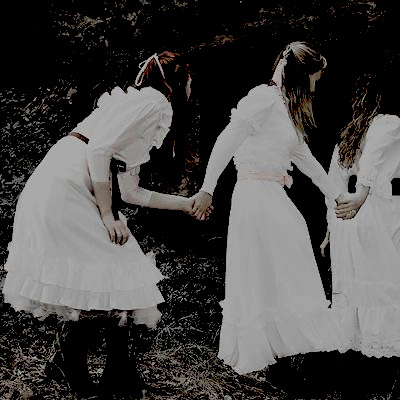
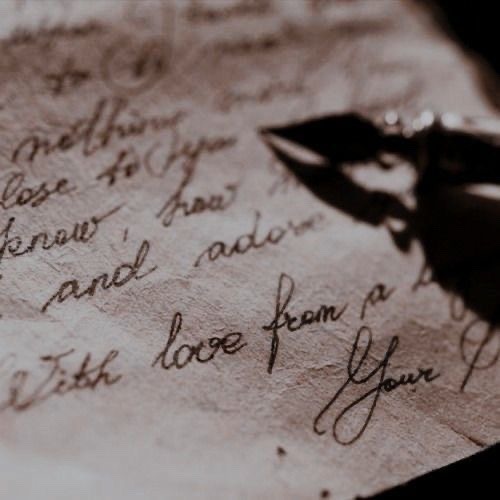
books i’ve read ❥ nicholas and alexandra / robert k. massie
❝ it is one of the supreme ironies of history that the blessed birth of an only son should have proved the mortal blow. even as the saluting cannons boomed and the flags waved, fate had prepared a terrible story. along with the lost battles and sunken ships, the bombs, the revolutionaries and their plots, the strikes and revolts, imperial russia was toppled by a tiny defect in the body of a little boy. ❞
42 notes
·
View notes
Text

The American Archive of Public Broadcasting wishes you a Happy National Library Week! Let's celebrate the invaluable role of librarians and libraries in fostering a love for literature and learning.
Explore the "A Word on Words" Collection, a treasure trove of insightful discussions about literature and the lives of authors. Dive into captivating conversations with renowned figures like Al Gore, Janet Leigh, Robert K. Massie, Rep. John Lewis, and Alice Randall.
With over 900 episodes spanning from 1972 to 2013, this remarkable collection produced by Nashville Public Television immerses you in the world of literature and history.
4 notes
·
View notes
Photo

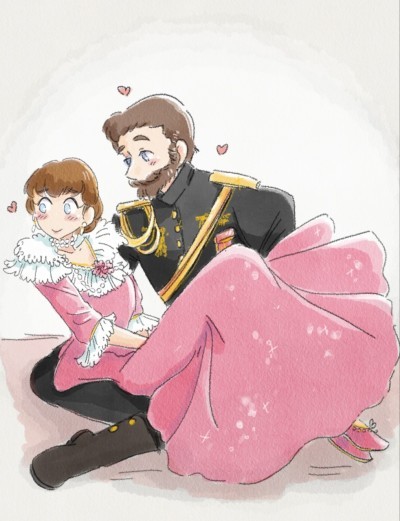
"I am yours and you are mine and of this there is no doubt. You are imprisoned in my heart, the little key has been lost and now you must remain there forever and ever."
-Alejandra Fyodorovna Romanova/Alix of Hesse-Darmstadt
“How sad to be forced to stay away from her for so long -he writes- Being together is wonderful, a real paradise".
- Nikolái Aleksándrovich Románov
These are quotes from letters of my two favorite lovebirds, taken from the book "Nicholas and Alexandra: Love and Death in Imperial Russia", written by ROBERT K. MASSIE. Every time I read this book I end up with a heavy heart, either because of the beautiful relationship they had or because I end up sad because of some mistake that led to their execution in a filthy cellar.
Since I began to love this historical couple, I have searched for some visual medium to move me and although there are photos of the two of them to say the least, the truth is that there are few where they show their love since most of them are formal due to the time and their position. as tsar and tsarina of Russia, but there is almost no content that visually shows that love that is so talked about in movies, series, documents, and historians.
I have already ordered a commission to be made in search of moving me and although I appreciate the work of that friend, it is not what I was looking for while the AI, although it touched my heart, lacked that spark that would make me review in the blink of an eye what those little letters and historical information have brought me so much... Until today...
Lately I have been feeling very inspired by this couple and based on this, the beautiful @littlecarnet she has given me this beautiful gift that not only gave me what I have been looking for so much, but has also created two lethal weapons of love that killed me with a bullet, now I am dead and I write it from a heart that exploded for so much beauty.I wonder now, if they had had the opportunity to have the internet and meet this beauty, what would they have thought and done? Based on what I have read and a little of what I have done with my CH comic, I imagine they were impressed, moved, you had this upholstered to hang it in a palace like a real painting and they gave a heartfelt thank you to the artist...But since sadly they are no longer here, I feel obliged to thank this gift with all my heart and go to fine arts to demand that they expose this beauty. Meanwhile today and in a month or more I will appreciate this with all my heart because this is a treasure...
THANK YOU SO MUCH SABINE!!!, YOU ARE THE BEST, PEOPLE AND ARTISTS LIKE YOU ARE WORTH EVERYTHING!!!, YOU HAVE MY ABSOLUTE ADMIRATION AND GRATITUDE!!!
#friendart#historical ship#Aleniky#Zar Nicolas II#empress alexandra#Alejandra Fiódorovna#rare ship#alix of hesse#Nicolas romanov#romanovs#ship real#This should be in an art show
20 notes
·
View notes
Text
My beautiful and/or antique books collection ♥️
American literature

British
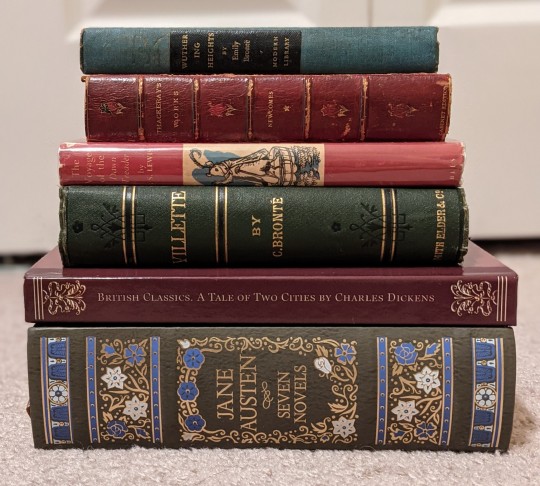
Russian

Heritage Club + Limited Edition Club
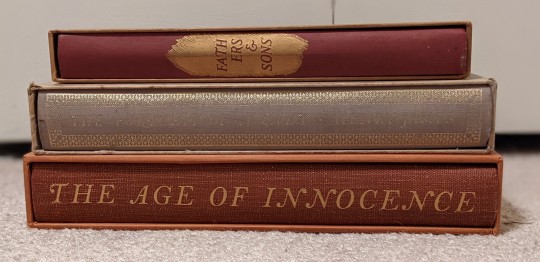
Gone with the Wind
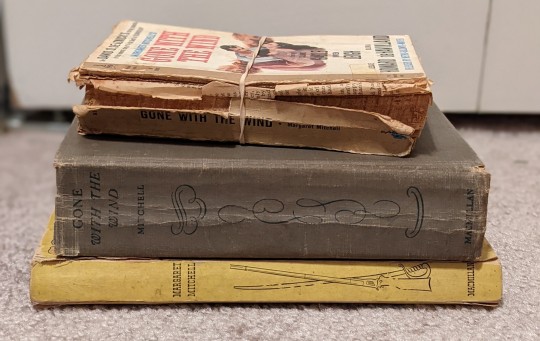
(I've already shared my Narnia and Tolkien books, so I won't repeat those here )
Details on the specific books:
American lit, top to bottom of the stack
Ethan Frome by Edith Wharton, published in 1911. My copy is from 1939 and I got it for 50 cents at a used book sale.
Laments for the Living by Dorothy Parker, published 1930. The latest addition to my collection, purchased yesterday from a used bookstore on a visit to my sister! My copy is a tenth printing from September 1936.
A Library of America anthology of Willa Cather's early novels (1905-1922) that I got for Christmas one year.
The Collected Works of F. Scott Fitzgerald (1920-1940) from the Wordsworth Library Collection. I picked this up at Costco, if you can believe it. Just a basic anthology, but very pretty.
Heritage Club copy of The Portrait of a Lady by Henry James (1881) that I picked up at a used bookstore.
Limited Edition Club copy of The Age of Innocence by Edith Wharton (1920) that my mom bought me for my birthday after someone never returned my original copy. One of the best gifts I've ever received.
British lit
Wuthering Heights by Emily Brontë, originally published in 1847. My copy is the Modern Library edition from 1939. I inherited it from my mom :)
The Newcomes by William Makepeace Thackeray, originally published in 1855. My copy is part of a 26 volume set of Thackeray's works from 1901. I found it for five dollars at an antique store.
The Voyage of the Dawn Treader by C.S. Lewis first edition, second printing. Arguably the jewel of my collection. It's a former library book and I bought it for myself as a reward for surviving the Covid lockdowns lol. In my defense, I'd had my eye on it for a while.
Villette by Charlotte Brontë, originally published in 1853. My copy is from 1887 (!) The other best Christmas gift I've ever received.
A Tale of Two Cities by Charles Dickens (1859). My copy is a British classics edition from an indie publisher where the whole thing is arranged like a newspaper. It's super cool.
Barnes and Noble edition anthology of Jane Austen's works
Russian
And Quiet Flows the Don by Mikhail Sholokhov (1940). My copy is from 1960. Not that antique, but I love it all the same. Another used bookstore find!
International Collectors Library edition of Nicholas and Alexandra by Robert K Massie (1967). They did a really beautiful series of "The World's Greatest Biographies." Yet another used bookstore find (I may spend too much time in used bookstores 😂)
International Collectors Library copy of Doctor Zhivago by Boris Pasternak (1957). Library book sale, I think.
Barnes and Noble edition of Anna Karenina by Leo Tolstoy (1878).
Heritage Club copy of Fathers and Sons by Ivan Turgenev (WITH its Sandglass paper!!). I got it for eight dollars (!) at an antique store.
Gone with the Wind (Margaret Mitchell, 1936)
My mom's copy, dated 1961. It's paperbound and falling apart, but it's one of the most precious objects I own. Probably the #3 object from my house that I would save in a fire.
A copy from 1937. It's an eighteenth printing and not especially valuable, but I think it's super cool that my copy was printed only a year after publication. Definitely the copy that I read/handle most often. From a used bookstore I think?? Genuinely not sure.
The Motion Picture Edition! That's right, I have the edition that got released with the movie in 1939. It's hilarious how similar and yet different it is from modern books like this. Glossy cover with pictures from the movie on the front and back, movie stills interspersed throughout, yet it's 8x10 and the text is set two columns to a page. This came from an antique store and I laugh to myself every time I look at it.
#my pride and joy#hope this post is enjoyable for others and not widely self indulgent lol#pontifications and creations#literature makes us more human
25 notes
·
View notes
Note
I need new books to read this year... can you recommend your favourite history books? Any era/subject pre-1900!!
Oh, boy! Fun. Okay - !
One of the best historical writers I've ever read is Barbara Tuchman. Not only is her research top-notch, she can also pull you along like a story. A lot of her books are about the 20th century, but A Distant Mirror is about the 14th century, an absolutely wild 100 years of warfare and social upheaval and - of course - a heaping helping of Yersinia pestis.
One of my professors when I was working on my first degree (in history) was Dr. Carole Rawcliffe. She is one of the experts on the history of medicine, and her Medicine and Society in Later Medieval England is an excellent read despite the rather dry title.
Another absolute classic along those lines is by William Manchester. Like Tuchman, he's better known for his books on the 20th century, but he wrote an excellent book about the transition from the Middle Ages to the Renaissance. A World Lit Only by Fire is considered a historical classic for good reasons!
Another I thoroughly enjoyed - and then I'll leave the Middle Ages, I promise! - is Chris Wickham's The Inheritance of Rome, about the first 600 years after the fall of the Western Roman Empire.
Thomas Cahill - who unfortunately recently died - wrote a ton of books on lesser-known people/places in the historic record, but my favorite by him is Sailing the Wine-Dark Sea, a wonderful little glimpse into Ancient Greece. His other books are good as well (the ones I've read, anyway), but that was the one I liked most.
Robert K. Massie is probably best known for his classic Nicholas and Alexandra, but he also wrote an amazing book about Peter the Great (literally called... Peter the Great) about the tsar who dragged Russia kicking and screaming into being a more "European" culture. St. Petersburg, the city he founded to be closer to European neighbors, is named for him.
Late Victorian Holocausts by Mike Davis is a very rough read, but also an important one. It looks at how colonial rule in the late 1800s impacted the colonized lands, particularly India. It's brutal, but well worth a read. Along the same lines, King Leopold's Ghost, by Adam Hochschild, looks at the impact of colonial rule in the Congo.
John Keay has written extensive books on the history of China and India. I haven't read the one about India, but the one on China is superb.
A History of Private Life (various authors) is a 5-volume set covering the Classical period up to the modern day. It's more academic than the pop history I've mentioned so far, but fascinating. I love thinking about everyday lives far more than a list of important names and dates, y'know?
A People's History of the United States (Howard Zinn) and Lies My Teacher Told Me (James Loewen) both well earn their reputation as the books criticizing the way American history is learned in the US. They cover a lot of ground before 1900, but do go into the 20th century. I'm not super into US history, but The American West and Bury My Heart at Wounded Knee (both by Dee Brown) are very good. (If you're familiar with the fictional Lonesome Dove, the Goodnight-Loving trail covered in The American West is the inspiration.)
The Eternal City by Ferdinand Addis is one of the few English-language books that covers Rome beyond the ancient empire and WWI. I'm a little biased towards Rome these days (and spend a whoooooole lot of time there 😅), but I promise the book is good! 😉
After the Ice (Steven Mithen) and Eve's Seed (Robert McElvaine) are both looks at truly ancient history, and well worth a read. (Full disclosure, McElvaine was also one of my professors.)
Rabid by Bill Wasik and Monica Murphy is a history of - you guessed it! - rabies. It's both eminently readable and terrifying, as you could probably guess. Plagues and Peoples by William McNeill more broadly covers epidemics through the years.
Some interesting and more obscure topics: Death by Drama and Other Medieval Urban Legends (Jody Enders) is more academically dry than the title suggests, but still very interesting! Madame Blavatsky's Baboon (Peter Washington) is about the rise of spiritualism in the 19th century. Lucy's Bones, Sacred Stones, and Einstein's Brain (Harvey Rachlin) looks at the history of culturally-important artifacts. And along those lines, there's always learning a little more about the people who dealt with such artifacts, like Gertrude Bell in a book by Georgina Howell (literally just titled Gertrude Bell).
A few other favorites: The Victorians (A.N. Wilson), A Gentle Madness (Nicholas Basbanes; it's about the history of book collecting), The Tudors (G.J. Meyer), Medieval Lives (Terry Jones), and Blood and Roses (Helen Castor, using the Paston Letters as a central theme in a broader history of the Wars of the Roses). (When I was in England, I lived where the Pastons did.) And just thought of another: Nabokov's Butterflies (Rick Gekoski) is a nice little collection about authors and books.
Oh! And The Lion in the Living Room (Abigail Tucker) is great fun - it's a history of cats!
With a few exceptions, these are pretty broad overviews. If you'd like anything more specific, let me know!
(For fascinating, well-written-but-not-always-factually-sound takes on history, Bill Bryson's A Short History of Nearly Everything and At Home are both great reads, but... don't accept everything he says as fully true and accurate. The same is true of Daniel Boorstin [The Discoverers, The Creators, The Seekers] - really great reads, but flawed.)
(If you want fiction that gets the history right: The Daughter of Time [Josephine Tey; covers late 15th century England], The Crimson Petal and the White [Michel Faber; covers the 1870s in England - but be warned, there's some graphic sex in it], Doomsday Book/To Say Nothing of the Dog/Blackout/All Clear [Connie Willis; cover - in order - the 14th century, 19th century, and WWII in England), Pachinko [Min Jin Lee; it's 20th century, but about Koreans in Japan, which I knew almost nothing about before reading], The Luminaries [Eleanor Catton; 19th century New Zealand], and the aforementioned Lonesome Dove [Larry McMurtry; 19th century US] are all excellent reads as well! Oh, and Hilary Mantel's books about Thomas Cromwell in 16th century England [Wolf Hall/Bring Up the Bodies/The Mirror and the Light] well deserved the awards showered on them, including two Booker Prizes. The Inquistor's Tale [Adam Gidwitz] is a book for kids and has magic, but it's super cute, well-written, and fun. Plus it has Guinefort, the only dog to become a saint! [Well... unofficially a saint.] I've recently gotten The Books of Jacob [Olga Tokarczuk], so haven't read it yet, but it's set in 18th century Poland and the author won the Nobel Prize in Literature! Speaking of good research and heaps of awards: Adam Johnson's The Orphan Master's Son is phenomenal. It's set in modern North Korea, but I'd still count it, especially as it covers a place many people know little about. In the same vein, Anthony Marra's A Constellation of Vital Phenomena does the same for modern Chechnya.)
Hope something piques your interest! Happy reading! 😁
14 notes
·
View notes
Photo

Purely in a physical sense, the abdication and imprisonment at Tsarskoe Selo were a blessing for the fearfully weary man whom Nicholas had become. For the first time in twenty-three years, there were no reports to read, no ministers to see, no supreme decisions to make. Nicholas was free to spend his days reading and smoking cigarettes, playing with his children, shoveling snow and walking in the garden. He read the Bible from the beginning. At night, sitting with his wife and daughters, he read aloud to them from the Russian classics. Gently, by example, he tried to make easier for Alexandra the painful transition from empress to prisoner. After the long midnight service on Easter Eve, Nicholas quietly asked the two officers of the guard on duty to join his family for the
traditional Easter meal in the library. There, he embraced them, not as prisoner and jailor, but as Russian and Russian, Christian and Christian.
Alexandra, unlike Nicholas, faced the overthrow of the monarchy and the beginning of captivity with deep bitterness. Proud and silent, thinner than ever before, her hair now predominantly gray, she remained most of the day on the sofa in the girls’ room. In the evening, she traveled by wheelchair to visit Anna, with Nicholas himself usually pushing the chair. Everything spoke to her of humiliation. Used to filling her rooms with violets, lilies of the valley and hyacinths from the park greenhouses or brought fresh from the Crimea, she was now forbidden these as “luxuries unnecessary for prisoners.” Occasionally when a maid or footman brought her a single branch of lilac, the Empress wept in gratitude.
For weeks, Alexandra remained convinced that, despite what had happened in Petrograd, the real Russia—the millions of peasants and the army—remained faithful. Only gradually, with a kind of bitter humor, did she begin to accept reality. Nicholas showed her the way. “He would sometimes laugh at the idea of being what he called ‘an Ex,’” said Lili Dehn. Alexandra picked up the expression. “Don’t call me an Empress any more—I’m only an Ex,” she would say. One day at lunch when an especially unpalatable ham appeared on the table, Nicholas made everyone laugh by shrugging and saying, “Well, this may have once been a ham, but now it’s nothing but an ex-ham.”
- Nicholas and Alexandra, Robert K. Massie.
1 note
·
View note
Text
tagged by @devilsflowermantis thank youuu
last song: if it's true by anaïs mitchell
currently watching: nothing, the most recent thing was 1899, it was good for the first couple episodes and goes downhill after that. which is a shame because the concept of 'groups of people stuck in a confined space who have to work together despite speaking different languages' is so strong imo
currently reading: catherine the great: portrait of a woman by robert k. massie
sweet/spicy/savory: savoury!!
relationship status: single
current obsession: i get to participate in surgeries at my internship and am loving it every day i go in hoping that a surgery is planned lmao
last thing i googled: new york subway dogs in bags (vet at my internship has the criteria that any dog of hers needs to be handbag-sized so i showed her those pics. she thought it was hilarious)
currently working on: i bought oil paints and am doing a study of john singer sargent's self portrait :)
im tagging no one if you want to do this you can say that i tagged you
3 notes
·
View notes
Text
Romanov myths part one: Alexei being injured by sledding down the stairs
Although Alexei was given more freedom than is assumed by many people, and certainly had a rambunctious personality, the long-standing story of him sledding down the stairs and then crashing, causing a haemophilia attack in Tobolsk is a myth.
Both Nicholas and Alexandra do not mention this in their diaries, and surviving letters from the Grand Duchesses also do not record Alexei’s rumoured ill-fated sledding adventure. This especially is unusual, as their letters from Tobolsk included a lot of detail about them having fun sledding and on the snow mountain they constructed, so this omission is telling. Alexei did, however, have a sled and a boat which he, his friend Kolya Derevenko, and sister Olga sometimes rode down the stairs and onto the pond (which appears to be mostly small pools of water with a lot of imagination) outside (Olga apparently lost her balance and then fell out once!)

From Alexei's diary (note how he does not mention crashing or having a haemophilia attack):
Sunday 25/7 March [1918]
At eight o'clock there was a religious service, Mama and the sisters sang because the choir was busy. Kolya came at two o'clock. We played in the garden in the afternoon. We shot at a target with bows and arrows [there is a photo of this - see below]. It's very interesting. After tea, we played hide and seek. I received a sleigh and a boat as a gift from a local trader, models of the sleds and boats of the region. Kolya and I played with them a lot and we went down the stairs in the boat. He left at nine o'clock.
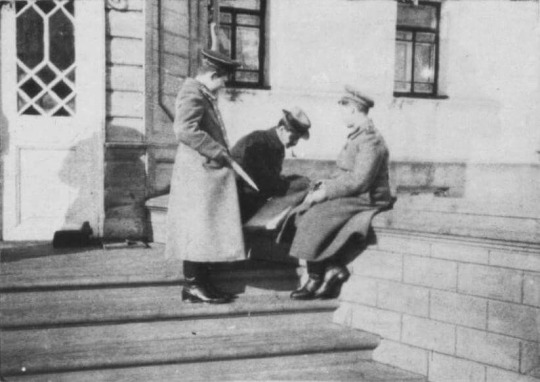

Alexei’s sister Anastasia writes about the boat and ‘pond’ here:
4/17 April 1918
Thank you very much, dear Dalechka, for the letter. It took a long time to get here – since December! But it is good it arrived. How are you? We think of you often. It is more or less quiet here. The weather has been divine, but not very warm the last few days. We continue to chop and cut up firewood, and it turns out pretty good. We fixed up our swing, and started to use it again, but probably the ropes will break soon as it has been done poorly. Our garden is a mass of water and mud. My brother has a little boat in which we, so to say, take a ride (it is a big imagination.) There is still not enough water, so we push it of the tracks with sticks and of course get completely soaked. Well, it is a little bit of fun! And how do you pass the time? Well, we are off for a walk so I must finish. I wish all of you the very best. Big greetings to all! I kiss you firmly. Greetings to your Papa and Seryozha.
Anastasia.
In reality, Alexei injured himself after contracting a bad cough. This was most likely caught off one of the visiting children to the house who kept him company, probably Kolya. The repeated coughing unfortunately triggered internal bleeding, leading to a haemophilia attack which left him unable to walk.
It was this attack that meant Alexei, Olga, Tatiana, and Anastasia were not moved to Ekaterinburg with their parents and sister Maria, as the Heir was too ill to move across the country. However, he did make some sort of recovery, at least to the point of being able to be safely transported to Ekaterinburg, and he is photographed sat upright on the Rus steamer, although looking thin. Despite this slight recovery, he was still unable to walk for the rest of his life. The night of the execution he was given a chair to sit on due to being unable to stand independently for any length of time.

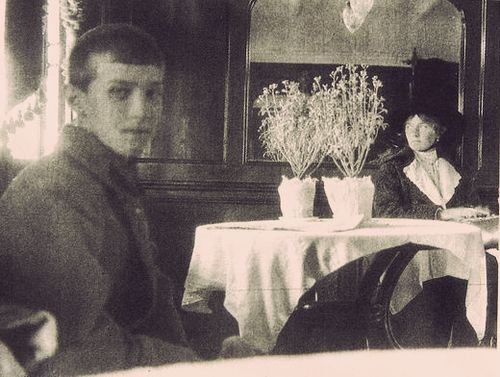
A staircase at Tobolsk
So - where did this myth of Alexei sledding down the stairs causing his last haemophilia attack come from?
Robert K. Massie’s 1967 book ‘Nicholas and Alexandra’ appears to be the origin of the story in popular history. On page 490, Massie wrote:
‘[Alexei] was devising new and reckless games which no one seemed able to inhibit. One of these — riding down the inside stairs on a boat with runners which he had used on the snow mountain — led to calamity. He fell and began to bleed into the groin.’
Whilst Massie’s book is a cornerstone in Romanov historical works, it was released 56 years ago, when there was still a fair amount of mystery and rumour surrounding the Romanovs and their final months. The 1971 film, also named ‘Nicholas and Alexandra’, adapted the book into a three-hour epic film dedicated a whole scene to re-enacting this myth, giving it more publicity.
VIDEO CREDIT: Nicholas and Alexandra, Franklin J. Schaffner, 1971, Columbia-Warner Distributors, Archive.org, uploaded by Olga Movie Man on December 26, 2019, https://archive.org/details/1971nicholasandalexandra. Alexei played by Roderic Noble. They make Tobolsk look a LOT rougher and barren than it actually was!!
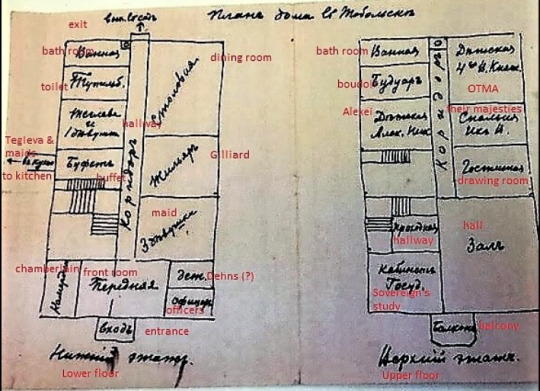
A floor plan of the Governor's Mansion, Tobolsk, drawn by Prince Vasily Dolgorukov. Translated in red by Helen Azar.
To summarise: although Alexei did have a boat and a sled whilst at Tobolsk and did ride them down the stairs, these games never caused a haemophilia attack and he never crashed them to the point of causing serious injury. Rather, he contracted a cough which caused internal bleeding. Robert K. Massie mistakenly put this in his book 'Nicholas and Alexandra', and the myth became more popular due to its inclusion in the 1971 film of the same name.
SOURCES:
Diary and letters quoted available here
Alexei: Russia's Last Tsesarevich - Letters, diaries and writings, by George Hawkins
Anastasia Romanov: The Tsar's Youngest Daughter Speaks Through Her Writings (1907 - 1918), by Helen Azar and George Hawkins
Nicholas and Alexandra - film, directed by Franklin J. Schaffner - free to watch here
Nicholas and Alexandra - Robert K. Massie - free to read here
Floorplan of Tobolsk - Helen Azar's website
Tour of Tobolsk in its current form as a museum - (Russian language!)
Photos: public domain, toptyumen
#Romanov#Romanov family#russian history#myths#myth busting#Alexei Nikolaevich#Alexei Romanov#Nicholas II#Tsar Nicholas#Alexandra Feodorovna#Tsarina Alexandra#OTMA#OTMAA#Nicholas and Alexandra#Nicholas and Alexandra 1971#Anastasia Nikolaevna#Anastasia Romanov#sources#dated#my own#Tobolsk#captivity#sledding#Olga Romanov#Tatiana Romanov#Maria Romanov#tsarist russia#romanov russia#romanov dynasty#romanov family
69 notes
·
View notes